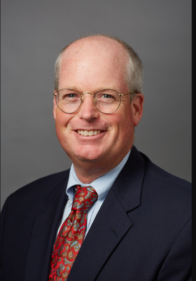
It’s not unusual for academics to wear a dizzying array of hats. The same is true of doctors, while clergy lives are often also a juggling act. What is less common is for one person to combine all three roles.
Professor Ben Doolittle has been attached to Darwin for the past month as a visiting scholar from Yale, where he is Professor of Internal Medicine and Paediatrics. He directs the university’s Combined Internal Medicine-Paediatrics Residency Programme for trainee doctors and, in addition to overseeing his students, is a practicing clinician, focused on HIV, Hepatitis C, addiction and primary care. More unusually, he is also an ordained minister, serving as a pastor at New Haven’s Pilgrim Congregational Church, with a teaching position as Professor of Religion and Health at the Yale Divinity School.
“As an undergrad at Yale College I did a double major in Biology and Philosophy,” he explains, highlighting that his two-stranded view of the world has deep roots. “I was very involved in community engagement, and I felt a vocation to be both a physician and a minister.”
Recognising that medical training is a treadmill which is difficult to leave and return to, he tucked in his Masters in Divinity first, before enrolling at Yale School of Medicine. He then served in mission hospitals in South India and Honduras, before returning to dual career paths at Yale.
In Ben’s view, his multiple roles are simply different aspects of the same urge to support people through life’s struggles.
“As I say to my students, ‘the medicine is easy, but everything else is hard.’ We know why certain treatments work, but it becomes complex because of the complexities of life. Doubt, angst, burnout – these are all spiritual, internal issues. We all have intrinsic struggles just below the surface, and people want to talk about it.”
Medicine in fact, he posits, has taken the position of religion for many of its practitioners.
“Medicine functions very well as a religion. It provides a shared world view, and affirmation of how important we are; it’s a noble purpose. But it’s never really enough because in the end the patient dies, and we’ll experience doubt or anxiety, and need that inner architecture.”
Ben finds himself in Darwin thanks to Yale’s policy of offering its faculty a three-month ‘triennial’ every three years. It’s common to split this entitlement up, taking a day off a week throughout the year for example, but Ben followed the advice of friends to take the opportunity for a complete reset. He made a connection with Cambridge’s Faraday Institute for Science and Religion, and took up the offer of Darwin Fellow Dr Edwin Rose, whom he had met during Edwin’s recent time at Yale, to form an affiliation with Darwin.
“I’m here for a month, and it’s been such a gift to step out of the ebb and flow of daily life,” he says. “I’ve been going to evensong at all the different College chapels, eating food from all over the world on Mill Road, working in Darwin’s library with its incredible view of the river and, through the Faraday Institute, meeting the most wonderful group of scholars and smart, thoughtful, devoted people.”
He has also been a supportive attendee at Darwin’s lunchtime Research Seminars, last week giving his own, The priest, the philosopher, the scientist, and the new age of medicine, in which he explored the changing position of healers in society across the centuries.
Life in a university like Cambridge or Yale can, Ben believes, lead to a surfeit of intellectual thought at the expense of mystery.
“We’re so steeped in the cerebral, intellectual life, trained to critique and evaluate and be sceptical. Faith offers other elements – mystery, wonder, love – which are not illogical, but are not logical either. Which is not to say that I’m not a logical, evidence-based physician. Medicine has rescued us from superstition and saved millions of lives, but it falls short.”
